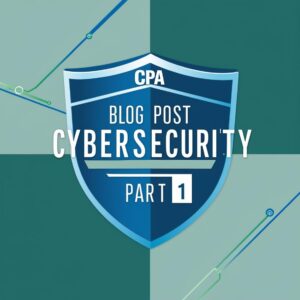Cybersecurity for CPAs: Understanding Your Obligations Under IRS Regulations
IRS cybersecurity regulations for CPAs have become increasingly critical in today’s digital landscape. The landscape of tax preparation has changed dramatically in recent years. While technology has made our work more efficient, it has also created new vulnerabilities that cybercriminals are eager to exploit. As trusted custodians of sensitive financial information, CPAs must understand IRS regulations and implement robust security measures to protect their clients’ data.
Why IRS Cybersecurity Regulations Matter for CPAs
Data thefts from tax professionals are increasing at an alarming rate. Cybercriminals aren’t just after credit card numbers anymore—they’re targeting tax professionals specifically because they hold comprehensive financial information that can be used for identity theft, fraudulent tax returns, and other sophisticated schemes.
Your Legal Security Obligations
As a CPA, you’re bound by multiple regulatory frameworks designed to protect sensitive financial information. Understanding these requirements is crucial for maintaining compliance and protecting your practice.
IRS Publication 4557: Your Security Blueprint
IRS Publication 4557, “Safeguarding Taxpayer Data,” provides a comprehensive framework for protecting your practice and your clients. This isn’t just another regulatory document—it’s your guide to creating a robust security infrastructure that meets IRS requirements.

Why This Matters to Your Practice
The consequences of inadequate security measures extend far beyond mere regulatory compliance:
- Financial Impact: Violations can result in penalties of up to $50,000 per security breach incident
- Professional Reputation: A single data breach can erode years of carefully built client trust
- Legal Liability: Security breaches can expose your firm to significant legal challenges
- Operational Disruption: Cyber attacks can halt your operations during critical tax seasons
The FTC Safeguards Rule
Many CPAs don’t realize that they’re considered “financial institutions” under the Gramm-Leach-Bliley Act. This classification brings specific obligations under the Federal Trade Commission’s Safeguards Rule, requiring structured security measures and documentation.
Essential IRS Security Requirements for CPAs
Written Security Plan
Your firm must develop and maintain a comprehensive written information security plan that includes:
- A designated security coordinator responsible for overseeing your program
- Specific security measures for all aspects of your operation
- Regular risk assessments and updates to your security protocols
- Oversight of service providers who access client information
Authentication and Access Controls
Modern security standards require multi-factor authentication (MFA) for anyone accessing client information. This means using at least two of the following:
- Something you know (like a password)
- Something you have (like a phone for verification codes)
- Something you are (like a fingerprint)
Single passwords, no matter how complex, are no longer sufficient.
Data Encryption Requirements
All client data must be encrypted, both when it’s stored (at rest) and when it’s being transmitted (in transit). This applies to:
- Stored tax returns and supporting documents
- Email communications containing sensitive information
- Remote access connections
- Cloud storage solutions
Real-World Consequences: Learning from Others’ Mistakes
Let’s look at what can happen when security measures fail:
Case Study: The $250,000 Lesson
A mid-sized accounting firm recently faced catastrophic consequences when cybercriminals accessed their client database. The breach resulted in:
- $250,000 in immediate regulatory penalties
- Costs exceeding $100,000 for client notification and credit monitoring
- Loss of 30% of their client base within six months
- Ongoing legal expenses from client lawsuits
Implementing IRS Cybersecurity Regulations: Next Steps
- Assess Your Current Status
Review your existing security measures against IRS Publication 4557 requirements. Document gaps and vulnerabilities. - Develop Your Written Security Plan
Create or update your security plan to address all required elements. This isn’t a one-time task—it’s a living document that needs regular updates. - Implement Basic Security Measures
Don’t wait for a perfect plan to implement essential security measures like multi-factor authentication and data encryption. - Train Your Staff
Your team needs to understand these requirements and their role in maintaining security. Regular training isn’t optional—it’s mandatory.

How Computer PRO Unltd Can Help
At Computer PRO Unltd, we understand that implementing these security measures can be overwhelming. Our team specializes in helping CPA firms achieve and maintain compliance with IRS and FTC requirements. We can help you:
- Conduct thorough security assessments
- Develop comprehensive security plans
- Implement required technical measures
- Provide ongoing monitoring and support
Contact us today to ensure your practice meets all security requirements:
– Phone: 636-442-2776
– Email: [email protected]
Remember: The security of your clients’ data isn’t just about compliance with IRS Regulations—it’s about maintaining the trust that forms the foundation of your practice. Taking action now can prevent devastating consequences later.
In our next article, we’ll dive deep into the essential security controls your practice needs to implement. Stay tuned for practical guidance on staff training, authentication systems, and network security essentials
To take a peek at our previous article, click here!

Technician at Computer PRO Unltd, father of one, gamer.
